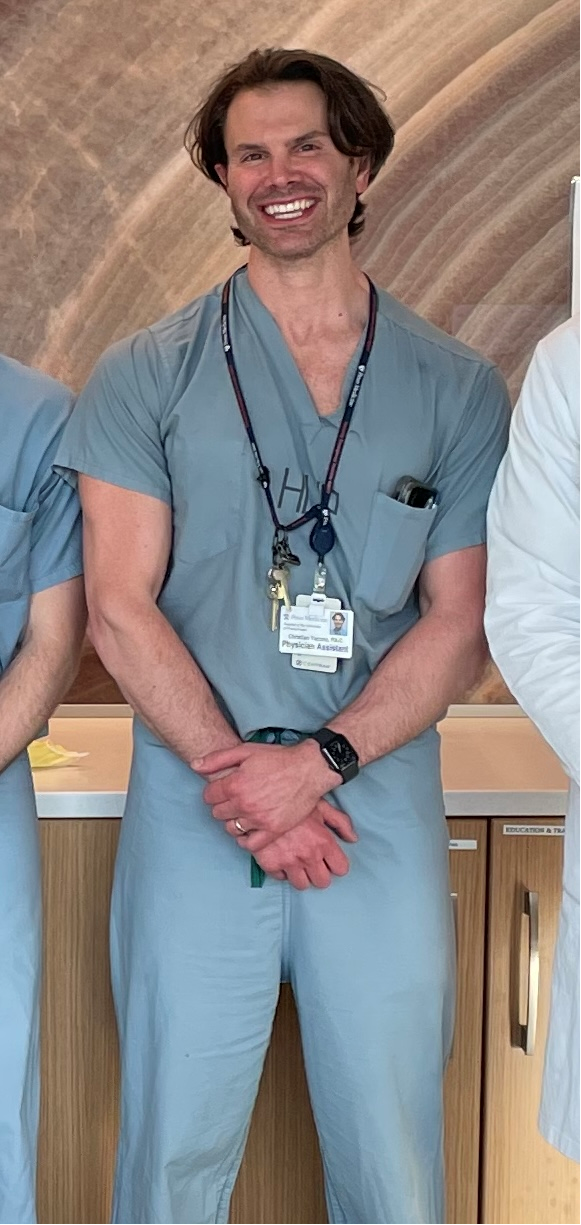Alumni Spotlight: Christian Yacono '03
November 14, 2023
 When did you graduate from Drexel?
When did you graduate from Drexel?
2003
What drew you to the PA profession and Drexel’s program, specifically?
I was heading to PT school but then had a shadowing experience with a few PAs I met in undergrad training and was blown away by their knowledge base, love for their jobs and impressive care of their patients. The rest, as they say, is history. Drexel’s program (then in the process of migrating from MCP Hahnemann to Drexel) attracted me particularly because of its rich grass-roots history, compassionate faculty, incredible relative size and track record for turning out some amazing PAs.
Was there a faculty member that inspired you during school?
Yes—three actually: Pat Auth, PhD, Joe Santoro and Alan Haroian, PhD.
After graduation, where did you practice?
I worked in invasive cardiology at Crozer Chester Medical Center.
In your first year out of school, what was the most important lesson you learned?
To be consistent in doing the basic things right—people start to actually take notice of this and not only are appreciative but also start to view you as a bit of a rock star. I guess the basics get overwhelmed by the rush, intimidation, compromise of standards and/or ego in some cases.
What environment do you practice in now?
I have practiced cardiology my entire 20-year career, although I am now and have remained in subspecialty cardiology (cardiac electrophysiology) exclusively for the past eight years.
How can PA professionals improve health equity?
I think it’s important to give people chances. Spend some time looking for passion in individuals—really seek it out. Then, once found, fan that flame and do your part to mentor, educate and intervene, irrespective of race, gender, color, background, etc.
Describe a day in your clinical practice.
In clinic: arrive a few minutes before 7 a.m., (whilst consuming lots of good coffee) review cardiac monitor transmissions, write admission notes for upcoming procedures, make preop calls to these patients, commence with seeing patients with one of our doctors in tandem in the office from about 8:30 a.m.–4:30 p.m. (grazing and drinking coffee and water all day between patients), then finishing final call backs, patient notes and lab reviews with the intended departure of 5 p.m.
In hospital: arrive a few minutes before 7 a.m., (whilst consuming lots of good coffee) receive sign out from overnight moonlighting coverage, round on urgent patients, attend morning conference to review procedures for the day, review telemetry on other non-urgent patients, admit procedure patients, see patients coming through the ED, see patients coming out of their respective EP procedures, deal with urgencies/emergencies throughout the day as they arise, all while grazing and drinking coffee and water all day between patients. Sign out to overnight moonlighting coverage; intended departure is 7:30 p.m.
For a student about to graduate, what strategies would you share about how to stay present and avoid burnout?
As ambitious and passionate as you may (and should) be to enter this awesome profession and start that first job, it sounds cliché, but it’s always advisable to keep the important things important. This could be faith, family, health, hobbies, nutrition or even sleep to name a few. After the whirlwind of demands placed on you through PA school and clinical rotations, these life areas will undoubtedly get challenged, blunted or blurred in some way. It will be important to invest in revitalizing those deficient areas, continue to nourish the ones that have remained strong, and then begin to set reasonable boundaries going forward so that you can be fresh and ready both at work and home. The approach, in my opinion, will keep the constant threat of burnout at arm’s length but will require periodic reassessments and course-corrections.